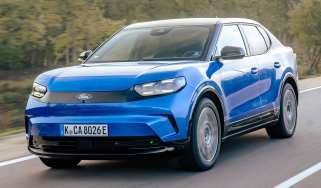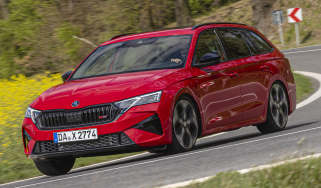Nissan GT-R
Three years after its launch, the GT-R has finally come of age. Is it even better than the giant-killing original?
A price rise of around £10,000 for a few mechanical tweaks and 40bhp extra seems like a lot of money – but now we’ve driven the new GT-R, we realise it’s worth every penny. In a straight line, the acceleration is even more phenomenal – Nissan’s supercar is a match for the 911 Turbo, and has a real sense of dynamic finesse – the electronics have taken a back seat and the driver is more in control. Who knows how good the GT-R will be in another three years...
At the GT-R’s launch in 2007, the chief engineer Kazutoshi Mizuno claimed: “The real car will arrive in three years.” So we’re guessing the heavily modified 2011 variant driven here is the model Nissan always intended the GT-R to be.
Visually there’s little to shout about. Slim LED daytime running lights are slotted into a modified front spoiler, which has been designed to increase downforce and reduce drag. A wider grille feeds more air to the uprated engine, and new lightweight Rays alloys save 3kg at each corner.
Interior changes are also quite mild, the most obvious being the carbon fibre trim on the control panel. Plumper dash leather is noticeable only to the trained eye, but our car’s two-tone trim helps the cabin feel more special.
Grabbing the headlines is a power hike for the twin-turbo V6, from 478bhp to 523bhp, plus a 16g/km drop in CO2 emissions, to 279g/km. Increased boost pressure, revised valve timing and a freer-flowing exhaust help to liberate the extra horsepower.
But it’s the extensive chassis revisions that make the GT-R even sharper to drive. Various changes designed to improve the ride and body control include strengthening around the suspension mounts – recognisable from the carbon fibre strut brace at the back of the engine bay – plus new dampers and revised Dunlop run-flat tyres. Do these make a difference?
For the first few miles it all seems familiar: the V6 has the same muted growl, while the driving position is still a little too high. Once the engine is warm, though, we put our foot down and discover the new GT-R’s ability.
The original car was blindingly fast with savage in-gear urge, but now it’s been taken to the next level. The turbos spin up earlier and give a stronger and more consistent response. After being squeezed back into the grippy Recaro seats, it’s no surprise to hear that the 0-62mph time has fallen by two-tenths of a second, to around 3.5 seconds.
Things sound better, too. The V6’s gruff beat is now underscored by a thrilling turbine-like whine on full boost. Road roar, which was associated with the original model, is significantly reduced.
The first few corners reveal that the chassis modifications have had quite an effect, and after a mile of fast sweepers and acute hairpins – some wet, some dry – it’s clear the GT-R’s character has changed entirely. Firstly, the steering is more positive – you simply turn the wheel and the nose darts into the apex.
Throw the car through a series of quick left-right turns and it reacts swiftly and cleanly to your inputs, remaining utterly composed and communicative.
In the past the GT-R would reveal its 1,740kg mass in such driving situations, yet this version is quite different. The slack has been taken out and, although it’s just as heavy, the car’s weight is better disguised and kept in check.
The current Nürburgring lap time for the GT-R is an astonishing seven minutes 26 seconds – but there are whispers this model could break seven minutes 20. A new, stripped-out Spec V, more luxurious M version and race-specific Club Track variant are on the way. And for those who want to update their current GT-Rs to 2011 spec, a Version Upgrade Kit is also being offered.
Rival: Porsche 911 Turbo
The GT-R’s rival has also gained a host of high-performance revisions, making it faster and better handling than ever. However, it carries a £38,000 price premium over the Nissan.



